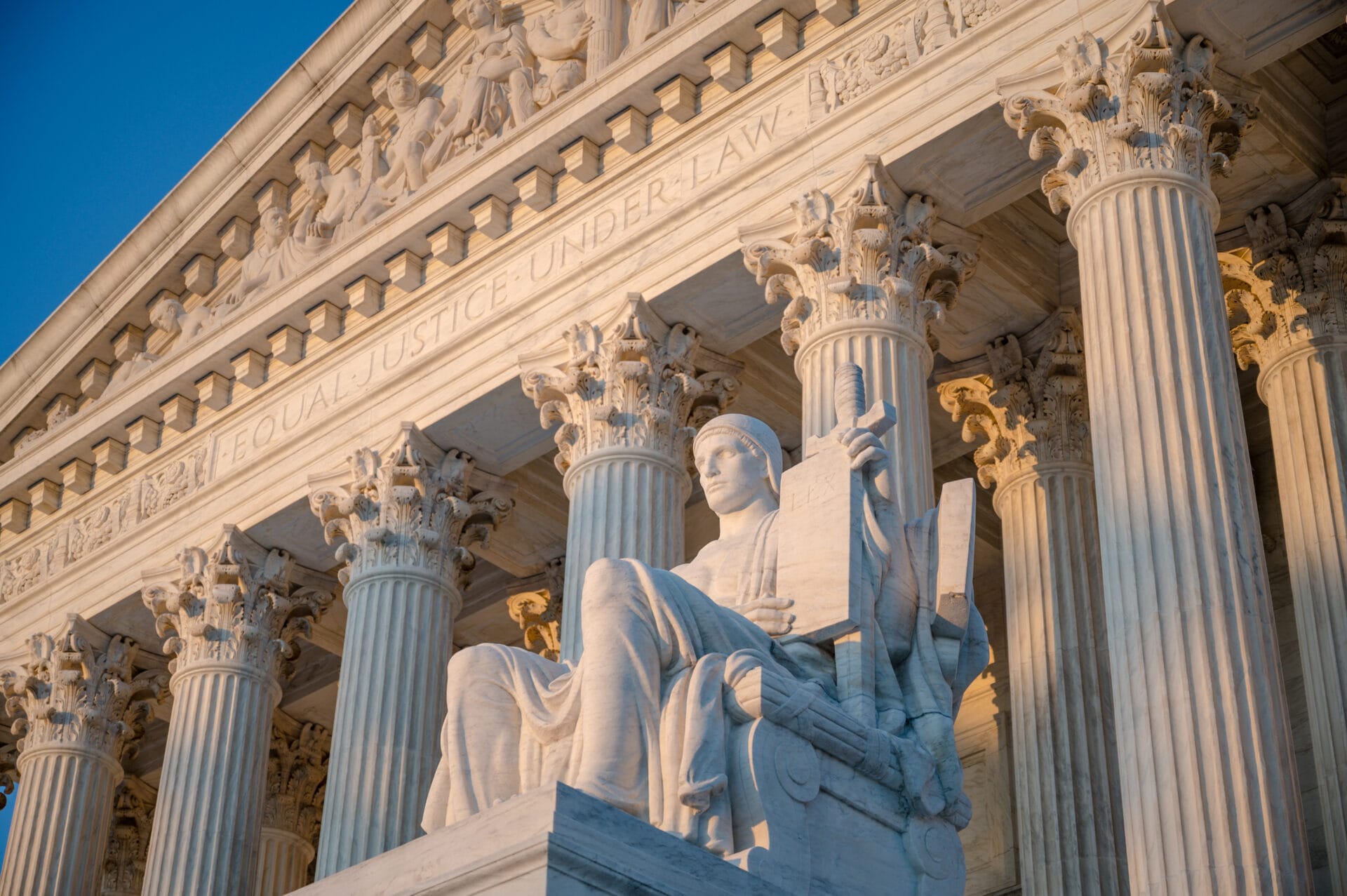On Monday, April 21st, the U.S. Supreme Court is set to hear oral arguments in Kennedy v. Braidwood Management, Inc., a case that could strip away a critical piece of the Affordable Care Act (ACA), which mandates insurance companies cover preventive healthcare services at no out-of-pocket cost.
Braidwood Management, Inc. originally initiated the case stating that, as a Christian-owned business and employer, providing coverage of PrEP violates their religious rights under the Religious Freedom Restoration Act or RFRA. It has now evolved into an attack on the constitutionality of ACA mandates for preventive service coverage.
While the case singled out PrEP and HIV prevention medication, Braidwood poses a major threat to most current ACA prevention coverage requirements which are providing millions of Americans with access to cancer screenings, heart disease medications, PrEP, and several other preventive care services without paying out-of-pocket.
Bottom line: Although right now preventive services should still be fully covered at no cost by most insurers, that could change very soon.
Why This Case Matters:
The outcome of this case has the potential to raise healthcare costs for 150 million Americans with private health insurance, as insurance companies would no longer be required to fully cover preventive services like lung cancer screenings, HIV prevention (PrEP), and medications to prevent breast cancer or heart disease. Millions of people could forgo critical care, leading to undiagnosed and fatal conditions. Put simply, losing preventive care without cost sharing will cost American lives. This is not just an issue for the LGBTQ community—it’s an issue that affects all Americans.
While the Braidwood case first focused on the LGBTQ community, it has much broader implications. The lawsuit began when a conservative activist employer sued to avoid covering health insurance that covered preventative care or their employees.without cost sharing, singling out HIV prevention medication (PrEP) as particularly offensive.
According to a report by Uncloseted Media, the attorney of the employers, Braidwood Management, argued that covering PrEP promoted “homosexual behavior” and “violated religious beliefs by making him complicit in encouraging those behaviors.” After hearing the arguments, a Texas federal judge wrote in his decision that the employer had “shown that the PrEP mandate substantially burdens its religious exercise.” The one bright spot for advocates is that the judge limited the ruling to apply only to the plaintiffs in the case.
The lawyer for the case, Jonathan Mitchell, is also a long-time opponent of the Affordable Care Act. In taking on the case, he went beyond the religious arguments to say that the entire preventive services coverage mandate as it is currently structured is unconstitutional- effectively turning an attack on PrEP into an attack on critical interventions for other healthcare concerns like cancer and heart disease. Here, too, the Texas judge sided with Braidwood, however this time he applied the ruling to the entire country. Following an appeal, the case has now arrived at the Supreme Court where the justices will look at the constitutionality of the ACA preventive services coverage mandate.
This targeted LGBTQ people by perpetuating discriminatory narratives, but if the Supreme Court rules in favor of Braidwood, it would harm and impact all Americans.
The Impact on All Americans:
While PrEP is central to the case, its implications extend far beyond HIV prevention. If the Supreme Court allows insurance companies to stop fully covering preventive services like cancer screenings, diabetes testing, and heart disease medications, it will make healthcare more expensive for everyone. Preventive care is essential to catching serious conditions early, but if people are forced to pay out-of-pocket for these services, many will not get the care they need. Studies project that even a small increase in cost for care can cause people to decline that care altogether. This will lead to more undiagnosed health issues, increased medical costs, and a rise in preventable illnesses across all demographics.

FAST FACTS
Facts About PrEP:
- 99% effective in preventing people from acquiring HIV.
- Protects from contracting HIV, including LGBTQ people and non-LGBTQ people.
- Covered by most insurance and state Medicaid programs, and required to be offered for free under the Affordable Care Act prevention coverage.
- There is no vaccine for HIV.
- Studies have projected that without full insurance coverage, even a small increase in the cost of PrEP can significantly reduce its use, leading to more HIV cases in the U.S., especially in the U.S. South, along with higher health care costs.
- KFF reports the cash price for generic PrEP is approximately $30 per month. The estimated lifetime HIV treatment cost is $420,285 ($1,079,999 undiscounted).
Fact About the Braidwood Case
- The Supreme Court will hear oral arguments in the Braidwood case on April 21, 2025.
- The case challenges the Affordable Care Act’s requirement for insurance companies to cover most preventive healthcare at no out-of-pocket cost.
- The lawsuit began when an employer objected to covering HIV prevention medication (PrEP) for their employees on religious grounds.
- Large majorities of U.S. adults oppose denying medical care, employment, and business services to LGBTQ people based on religious beliefs. 84% of adults oppose denying health care to LGBTQ people based on religious beliefs. (Williams Institute/NORC)
- PrEP is a vital medication that helps prevent HIV and has been credited with accelerating efforts to end the HIV epidemic in the U.S.
- It is estimated that the loss of full coverage for PrEP would lead to thousands of people acquiring HIV in the first year who wouldn’t do so otherwise.
- If the Supreme Court rules in favor of Braidwood, it could allow insurance companies to stop fully covering preventive services like PrEP.
- Other preventive care services also at risk include: cancer screenings, diabetes screenings, and medications to reduce heart disease and breast cancer.
- Eliminating full coverage for preventive services could increase health care costs for 150 million Americans with private insurance.
- Without these protections, Americans would have to share out-of-pocket costs for critical health services like lung cancer screenings and diabetes tests.
- Millions of people will forgo essential screenings and medications, leading to undiagnosed conditions and fatal illnesses.
- Studies project that even small increases in out-of-pocket costs for PrEP and other preventive services lead to a decline in usage, worsening public health outcomes.
- A ruling against preventive care coverage without cost would disproportionately affect vulnerable populations, including LGBTQ+ individuals, particularly Black and brown folks, and lower-income and working class communities.
- PrEP is up to 99% effective in preventing new HIV infections, and without full coverage, fewer people would have access to this vital medication.
- A majority of Americans, including 72% of Republicans, support maintaining no-cost coverage for preventive services like cancer screenings and HIV prevention.
- If the Supreme Court sides with Braidwood, it would set a precedent allowing health insurers to implement cost-sharing for services currently covered under the ACA.
- Preventive care has been proven to lower overall health care costs by catching conditions early before they become more serious and expensive.
- The Braidwood case has been funded and led by conservative groups seeking to undo protections offered under the Affordable Care Act.
- The case is a direct challenge to one of the ACA’s most popular provisions, which helps make healthcare more affordable and accessible.
- If the protections against cost sharing are removed, it would make it harder for many Americans to access basic health services without significant financial strain.
- This case isn’t just about PrEP; it’s about whether insurance companies can increase out-of-pocket costs for several life-saving preventive services.
Facts About the Impact on Health Disparities
- Access to preventive care has played a critical role in reducing health disparities in America.
- According to the American Cancer Society, Black people have the highest cancer-related death rate and shortest survival of any racial or ethnic group in the U.S. — and Black women are 41% more likely to die from breast cancer than white women.
- Heart disease is the leading cause of death for Latino people in the U.S., followed by cancer.
- Research has linked the ACA to a significant increase in preventive care — such as mammograms and screenings for cancer, cholesterol, blood pressure, and diabetes — leading to improved health outcomes for Black and Brown communities.
- If the Court rolls back these protections, millions of Americans have said they will forgo preventive care.
- Loss of preventive care would widen health disparities and lead to an increase in deaths among racial and ethnic minorities and low-income Americans.
- Many characterize that if the Court rules in favor of Braidwood, it would be an overreach by the Supreme Court that would unravel the ACA and force patients to pay out-of-pocket for lifesaving cancer screenings and medications.
- If the Court rules in favor of Braidwood, it would spike health care costs and roll back the progress made on reducing health disparities.
Other Resources and Case Information
- Lambda Legal case file
- Original Complaint/Texas Court Filing
- The Supreme Court Case That Could Change Health Care Coverage for Millions of Americans, Equality Federation and CHLP (2025)
- Explaining Litigation Challenging the ACA’s Preventive Services Requirements: Braidwood Management Inc. v. Becerra (KFF)













